- Advice from the Enterprise Climate X Forum: How do we pay for the green transition? (Climate Finance)
- Jordan will receive a GEFF facility of USD 40 mn for on-lending to the private sector. (Climate Finance)
- We’ve all heard of carbon credits — but bio credits are kicking it up a notch. (The Macro Picture)
- EV prices in Europe could rise by 10% as the EU refuses to extend tariff exemptions for components. (What We’re Tracking Today)
- Moroccan farmers will be the first to grow a drought-resistant variety of wheat within three years. (What We’re Tracking Today)
- Iraq is getting offers from Chinese companies to solve its energy crisis.(What We’re Tracking Today)
- What happens when a group of students decide to stop food wastage in Dubai? (On Your Way Out)

Wednesday, 7 December 2022
The opportunity for MENA financial institutions in the climate industry
TL;DR
WHAT WE’RE TRACKING TODAY
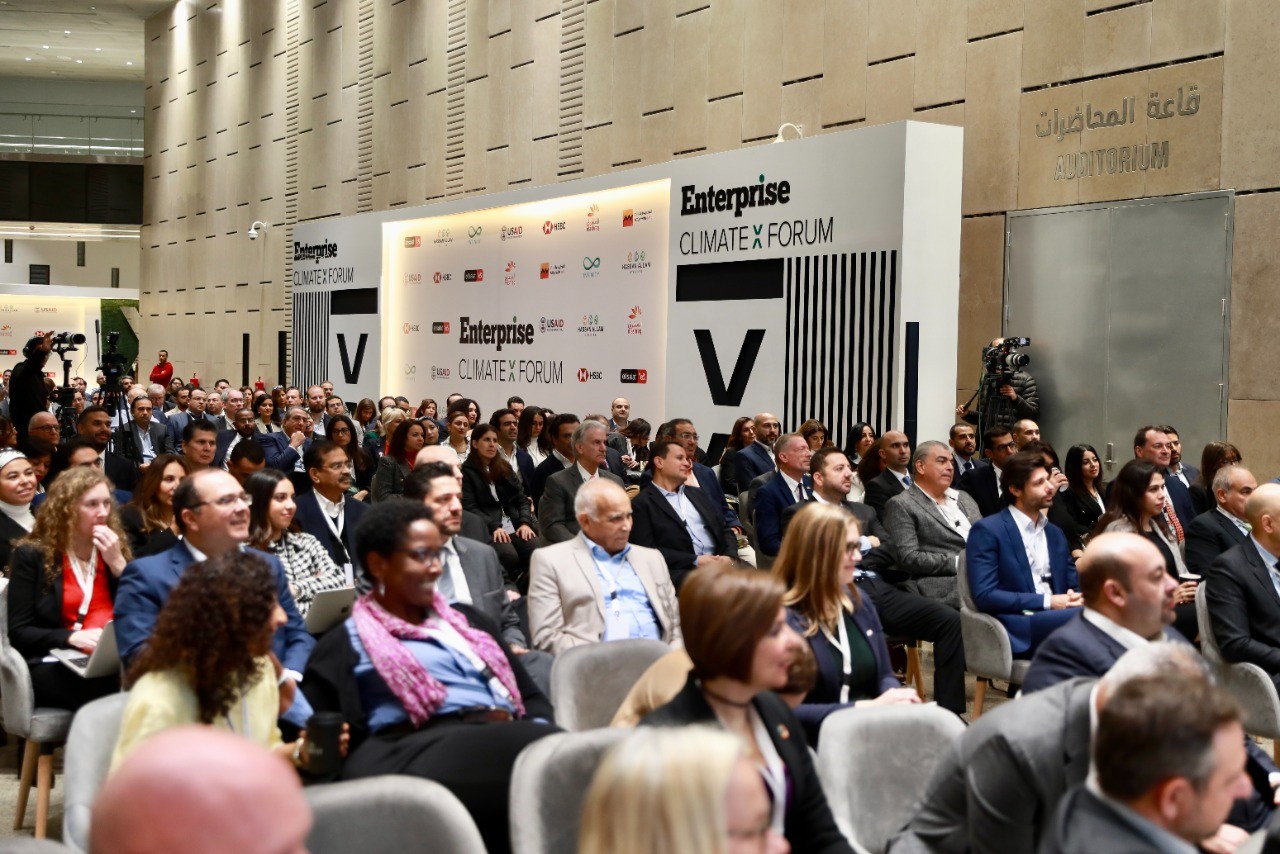
Good morning, friends. We bring you a relatively calm morning in terms of regional climate news, although we’re writing to you after the Enterprise team had an exceptionally exciting day yesterday.
We were thrilled to welcome so many of you from Egypt and the region at our first Enterprise Climate X Forum at the Grand Egyptian Museum yesterday to discuss what we firmly believe is the most compelling industry of our generation.
The forum tackled the climate industry from A-Z, from explaining green hydrogen — which remains an early stage of its rollout, looks set to become is a key component of our future energy mix — to how corporates in global emerging markets are coping with climate change. We also took a deep dive into climate finance to look at the role banks play in getting green projects off the ground — and what the opportunity in climate financial means for financial institutions (which we recap for you in the news well below).
WE HAVE MORE in this morning’s EnterpriseAM and will have additional coverage over the coming days.
Please join us in thanking the wonderful people who made yesterday, our friends at: USAID, HSBC, Mashreq, Attijariwafa Bank, Etisalat by e&, Hassan Allam Utilities, and Infinity.
STAY TUNED- The Enterprise Climate X Forum is our first large-scale event, but it’s not our last. We look forward to welcoming many more of you at our slate of Enterprise X Forums coming up in 2023.
ICYMI- Should we prioritize adaptation to climate change or mitigation? It shouldn’t be a zero-sum game, our panelists yesterday at the Enterprise Climate X Forum agreed — in fact, the regional private sector is growing particularly interested in adaptation (learning to live with a changing world) and not just mitigation (how to lower our emissions).
But when big money is involved, the debate can get heated. The state of the debate globally has seen wealthy nations champion mitigation for a long time now, but developing nations — who disproportionately bear the brunt of climate change — are pushing for much more financing for adaptation. We have more on the mitigation vs. adaptation debate in this week’s Going Green in EnterpriseAM.
THE BIG CLIMATE STORY OUTSIDE THE REGION- The EU doesn’t want products linked to deforestation: The European Commission sealed a provisional agreement yesterday to reject products that come from deforested lands. This includes coffee, beef, palm oil, timber, cocoa, rubber, charcoal and soy — generally in their pure form, but also including their derivatives. The commodities and products that fall under this category will no longer be imported or sold in the EU. (Bloomberg | Reuters | Euronews)
SOUND SMART- The decision comes a day before the kickoff of the UN’s biodiversity summit COP15 in Montréal. COP15 runs through19 December. The UN Biodiversity Conference is looking to reach a post-2020 global biodiversity framework which includes 21 targets to hit by 2030 in a bid to preserve and safeguard nature.
ALSO- EV prices could rise by 10% in Europe: The EU’s refusal to extend tariff exemptions on essential components needed for electric vehicle manufacturing could lead to a 10% price hike from 2024, the Financial Times reports. Under the UK-EU Trade and Cooperation Agreement, EVs are temporarily exempted from the rules that products must be substantially made in Britain or the EU to qualify for a zero tariff. A large portion of EV batteries are imported from Asia, leading both EU and UK car manufacturing groups to press for an extension on the tariff exemption due to a lack of locally-made batteries and precursor chemicals needed for EV manufacturing.
WATCH THIS SPACE #1- Moroccan farmers will be the first to grow a drought-resistant variety of wheat within three years, the Guardian reports. Farmers and crop scientists developed this cross hybrid variety of wheat — called Jabal — by mixing commercial durum wheat with a wild Syrian relative to produce a climate resilient crop.
REMEMBER- A 1°C rise in temperatures could cause a 6.4% drop in the amount of wheat grown around the world, the BBC reported last month. Universities and institutions worldwide have been engineering more resilient and nutritious foods as droughts and other climate risks threaten agriculture and food security.
WATCH THIS SPACE #2- The construction contract for Kuwait’s North Kabd sewage treatment extension project could be awarded by 1Q 2023, Zawya reports, citing a source it says is in the know. The country’s Public Works Ministry had issued the tender for the contract, which will include the management, operation, and maintenance of the entire plant, in July. The project is set to increase North Kabd’s capacity by 90k cubic meters per day (cbm/d), bringing the entire facility’s treatment capacity to 270k cbm/d. The USD 500 mn overall plant is expected to be fully completed by 2025, the outlet quotes the source as saying.
HAPPENING TODAY-
The Big 5 Global Construction Impact Summit is kicking off today at the Dubai World Trade Center in UAE. The event will bring together more than 2k exhibitors and regional and global construction industry leaders to discuss ways to meet net-zero and waste-reduction targets.
|
***
YOU’RE READING ENTERPRISE CLIMATE, the essential MENA publication for senior execs who care about the world’s most important industry. We’re out Monday through Thursday at 4am Cairo / 5am Riyadh / 6am UAE.
Were you forwarded this email? Get your own subscription without charge here or reach out to us on climate@enterprisemea.com with comments, suggestions and story tips.
***
CIRCLE YOUR CALENDAR-
Saudi Arabia will host the China-Arab Summit this Friday, 9 December. The Chinese delegation — including President Xi Jinping — will discuss and potentially sign dozens of agreements with KSA and other Arab states covering energy, security and investments, according to Reuters.
Tunisia will host the International Renewable Energy Congress from Tuesday, 13 December to Thursday, 15 December in Hammamet. The event will provide a platform for researchers and industry leaders to showcase trends in the renewable energy sector.
Saudi Arabia will host The Future Minerals Forum on Tuesday, 10 January to Thursday, 12 January at the King Abdulaziz International Conference Center. The forum will discuss the region’s critical minerals supply and creating resilient and responsible minerals value chains for the energy transition.
Check out our full calendar on the web for a comprehensive listing of upcoming news events, national holidays and news triggers.
CLIMATE FINANCE
Getting into the nitty gritty of climate finance at Enterprise’s Climate X Forum
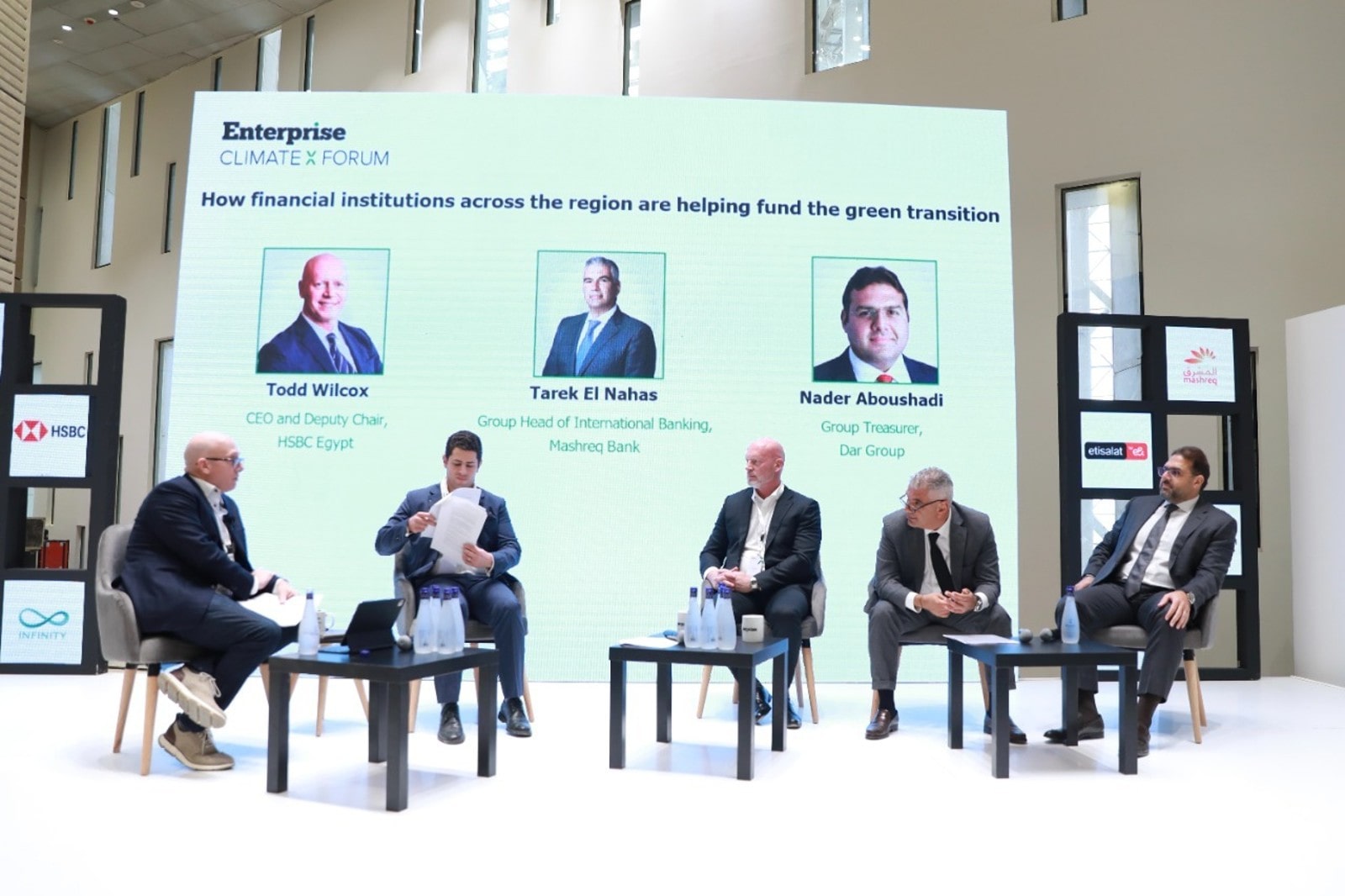
How to capitalize on the growth potential of climate and sustainability finance — an Enterprise Climate X panel discussion: Enterprise Climate X’s climate finance panel tackled where the opportunities are in the climate industry for banks and for their clients. We discussed where the funding is coming from, the mainstreaming of gree- and sustainability-linked finance, who counts what’s qualifies as green or sustainable, worries about greenwashing, what’s driving appetite among corporates for green and sustainable finance, and more.
The discussion brought together:
Todd Wilcox, CEO and vice-chair, HSBC Egypt
Tarek El Nahas, Group Head of International Banking, Mashreq Bank
Nader Aboushadi, Group Treasurer, Dar Group
Climate and sustainability finance are a huge area of growth for banks: “This will be a significant growth sector for us in the next five years,” said HSBC’s Wilcox. Mashreq considers this kind of financing to be its “single biggest” growth prospect, having facilitated USD 13.5 bn sustainability-linked loans in the last two years, with a commitment to more than double this by 2030, said El Nahas.
Looking beyond MENA shows how speedy this growth could be: Globally, HSBC participated in green and sustainable transactions worth some USD 46 bn in 2021 — three times the value of 2019, said Wilcox. And in Europe today, some 40% of all loans provided are sustainability-linked — up from effectively zero five years ago. “Imagine as this starts moving into the MENA region,” said El Nahas.
Dar Group sees a “massive” business case to deliver sustainability solutions to clients on a daily basis, said Aboushadi. Large-scale projects in areas like district cooling and the design of stadiums in Qatar are key examples of its work in this field, he added, all of it demanding, by definition, green finance.
The market for sustainability-linked finance market could be significantly larger than that for straightforward green finance market, El Nahas noted. Green loans and bonds are often used to finance climate-friendly greenfield projects such as wind farms or hydrogen plants, often with a blended finance component. But sustainable finance and sustainability-linked finance can be priced at commercial market rates, possibly with incentives linked to a project’s KPIs, but no concessional financing. The scope of sustainability instrument deployment is broader than that of pure green finance.
In the GCC in particular, much of the demand for sustainability-linked finance will come from highly-polluting industries: “It’s not only the green industry that’s going to lead this transition,” El Nahas said. A bank with clients in the GCC can’t realistically refuse to finance the carbon industry, for instance. “What’s more interesting is who’s acting responsibly.” If a company in the UAE that consumes over 30% of the country’s electricity seeks CAPEX financing to build a solar plant that will reduce its consumption by 5%, “that moves the needle” — potentially making a substantial dent in emissions, he noted.
There is strong and growing demand for sustainable finance across Egypt and the wider region, says Wilcox. “Working with clients on their sustainability plans, my big learning is the clients are leading us,” says the HSBC CEO. Local arms of multinationals, in particular, are highly engaged with sustainability topics, and are generally among the most advanced in their thinking and action on the subject as they answer to investors and shareholders whose net-zero commitments have an impact across the whole value chain, Wilcos noted.
“It’s not regulatory-driven. It’s being driven by money,” Wilcox added. “People are looking for returns that are sustainability-linked.” The banks themselves wouldn’t be able to drive this change if there wasn’t a clear economic value proposition, he noted.
Companies with sustainability plans are becoming more appealing for banks to lend to: Many banks have their own sustainability targets, often highly correlated with country commitments or investor requirements, Wilcox said. He and El Nahas agreed there is a burgeoning market for corporates looking for sustainable finance from banks — that banks will be competing for corporate business, a trend that will only accelerate as more and more companies integrate sustainability into their business operations, Wilcox noted. Companies with sustainability plans will see multiple banks and investors coming to them.
Don’t have a sustainability plan? “If you don’t have a plan, the cost of capital will continue to go up,” Wilcox added.
Case in point: Mashreq was sustainability advisor for Bahrain’s Noga Holding’s recent refinancing of its existing debt, noted El Nahas. Demand from participating banks for transaction ultimately outstripped the size of the facility, El Nahas noted.
What could edge sustainability-linked finance ahead of conventional finance? More standardization and clarity: An international company operating in different jurisdictions could risk accusations of greenwashing if it borrows in one part of the world and then deploys the funds in an area with different reporting requirements or classifications of assets and liabilities, said Aboushadi. “The market is there, and the [agreements] would be there if there was more clarity.”
International sustainability standards — in particular the International Sustainability Standards Board (ISSB)’s forthcoming work, brought to you by the people who created IFRS, the de-facto global standard for accounting — could be a good start, our panelists agreed.
But country differences will remain a reality: “It’s going to evolve over time. Nothing will work for everyone,” said Wilcox. “If you want to avoid greenwashing, which has burned some in the global system, it’s best to set internal guidelines and apply them rigorously.” Banks operating across countries and regions need to apply global filters, he added. Some countries are also working on standardization — with the UAE currently working on a taxonomy for sustainability-linked finance, said El Nahas. “Standardization facilitates the movement of capital globally,” he added.
Banks are also excited about concessional finance and the growing role of multilateral lenders and export credit agencies taking on some of the risk of large transactions. Doing so would derisk a wide range of projects in a rate marked by rising interest rates and high inflation, the panel noted.
There’s clearly a growing demand for carbon credits, but the market is likely to be transitional, said Wilcox. “It’s not the end solution.”
And no, readers, climate finance is not all for megaprojects such as hydrogen and renewable energy facilities. Businesses of all sizes have growing appetite for sustainable finance — Wilcox rejoined us on stage for our last panel of the day, when he spoke at length about how and why HSBC was financing working with one of the most interesting climate-focused startups we’ve ever heard of. More on that another day.
Our thanks to the nice people at CairoScene and StartupScene for the imagery from yesterday, which you can see at the head of this story and of which you’ll be seeing more in the days to come.
** The Enterprise Climate X Forum is proud to be supported by USAID, HSBC, Mashreq, Attijariwafa Bank, Etisalat by e&, Hassan Allam Utilities, and Infinity.
CLIMATE FINANCE
Jordan lands another GEFF financing facility to push forward with green transition

Jordan secures more GEFF financing: Jordan will receive USD 40 mn for on-lending to the private sector from The European Bank for Reconstruction and Development (EBRD), the European Union (EU) and the Green Climate Fund (GCF)’s Green Economy Financing Facility programme (GEFF), according to a statement issued by the EBRD. The GEFF has financed facilities worth USD 22 mn to Jordan this year including Cairo Amman Bank, Etihad Bank and the Microfund for Women.
The details: The USD 40 mn loan EBRD, GCF and EU will provide the funds in financing to local banks, microfinance institutions and leasing companies to on-lend to the private sector for investment in high-performance technologies and services to support Jordan’s green economy.
Jordan is forging ahead with renewables: Jordan hosted the International Investment Forum for Renewable Energy and Energy Efficiency in late October to discuss renewable energy, energy efficiency, smart cities and grids, green hydrogen and sustainability. The Hashemite Kingdom is pushing for greater investments and cooperation in renewables including green hydrogen discussions with Norway, conducting a feasibility study for a 2 GW wind project with the UAE, as well as previous wind and solar farms with Alcazar Energy.
REGIONALLY- This recent GEFF facility is part of a raft of recent regional loans for on-lending to climate-focused SMEs. Morocco’s Bank of Africa – BMCE Group recently secured EUR 13 mn in loans to use for on-lending to SMEs, with EUR 9.75 mn of this funding coming from the EBRD and EUR 3.25 mn from the GCF, and the EU providing a separate EUR 1.43 mn grant. Last year, the EBRD greenlit a USD 25 mn loan to the National Bank of Kuwait Egypt in April, a USD 50 mn loan to QNB AlAhli in June, and a USD 100 mn facility to Egypt’s Banque Misr in November.
ALSO ON OUR RADAR
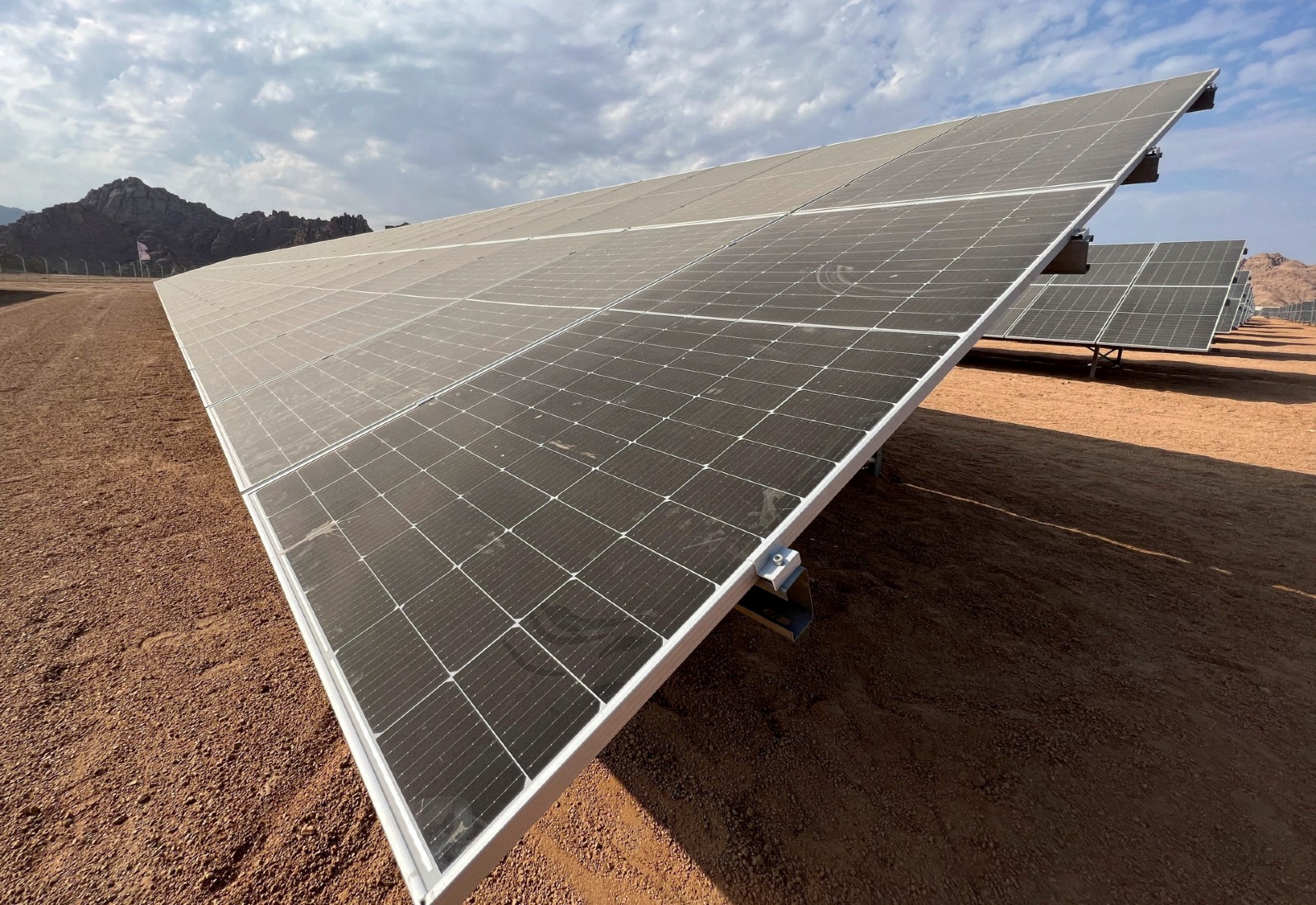
A newly-established joint committee in Iraq will discuss renewables offers in a bid to resolve its energy crisis, Sot al Iraq reports. Several Chinese companies have submitted proposals to develop wind and solar facilities, the news outlet quotes committee member and MP Sohaila Al Sultani as saying. Iraq’s Environment Ministry and National Investment Commission are also preparing a new solid waste-to-energy law to attract investments, the Environment Ministry's technical department head Issa Fayad was quoted as saying last month.
Bidding for Oman’s green hydrogen projects to begin this week: State-owned Hydrogen Oman Company (Hydrom) says over 40 companies purchased requests for qualifications for its green hydrogen blocks and will invite bids later this week, Hydrom acting manager Firas Al Abdwani told WAF news. Companies will have until January 2023 to submit their bids. By the end of 1Q 2023, two blocks of land for project development will be awarded in Duqm, followed by an additional four blocks of land in Thumrait by the end of 4Q 2023.
THE MACRO PICTURE
In the wake of COP15 for biodiversity, a new environmental credit is making noise
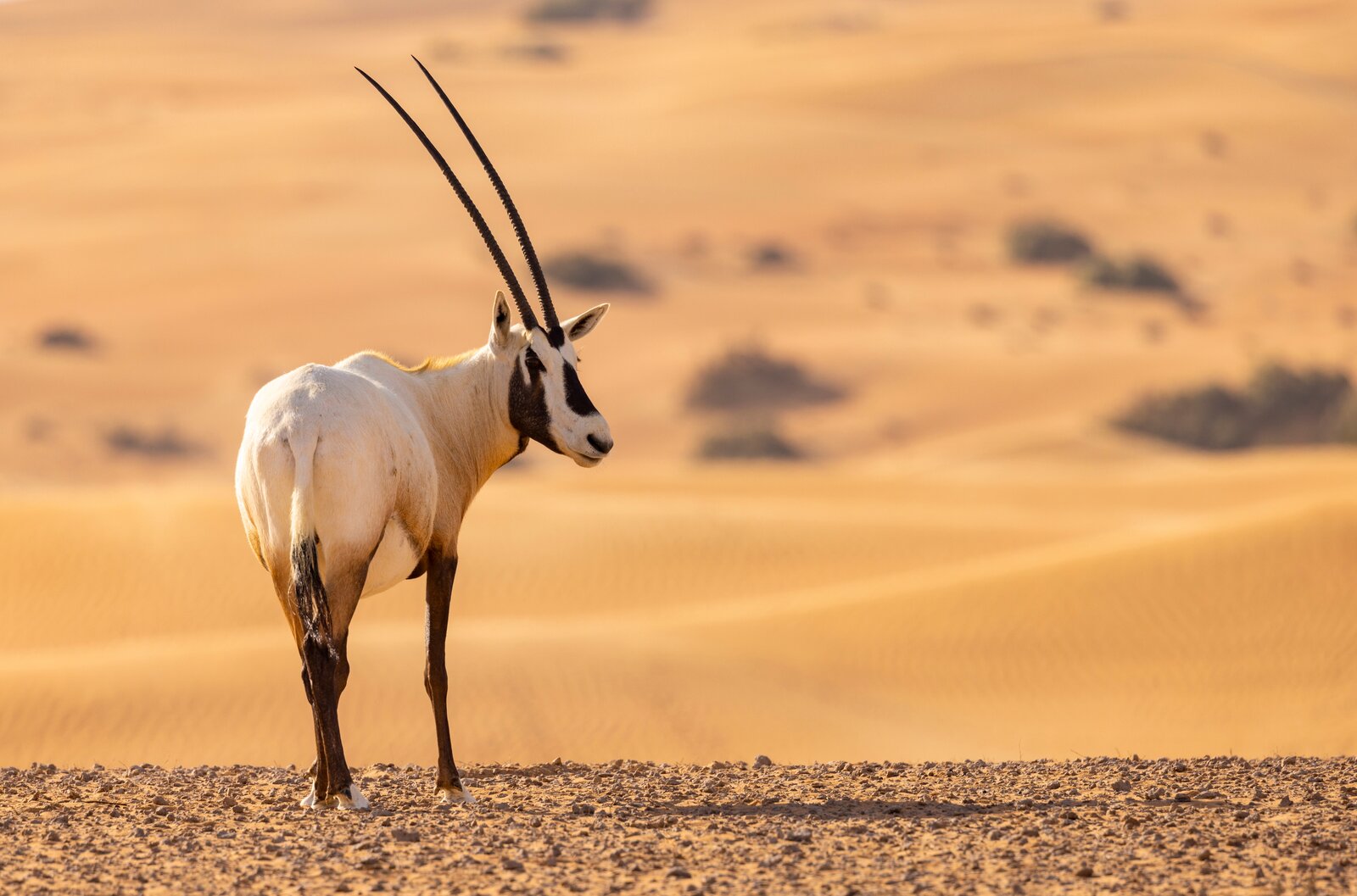
Is there a new tool for carbon offsetting on the block? Carbon credits are newly on the radar in MENA this past year, with at least three markets launching or announcing their plans to launch carbon trading exchanges and Saudi’s PIF making its first big transaction. The ongoing debate over greenwashing in a world in which rules about standards and assurance are still taking shape is leading to the emergency of a very embryong rival (and potentially complementary) tool that companies could use to lower the cost of finance when they invest in projects that safeguard biodiversity in a more verifiable way. Its early days, but here’s the rundown:
REFRESHER- Carbon credits are permits allotted to companies and countries that put a cap on the overall greenhouse gasses they are allowed to generate. If they exceed their limits, they can purchase credits from counterparts who haven’t reached their carbon generation caps. Carbon markets facilitate the trade of carbon credits. Sellers can use proceeds to drive investment or fund operations, and buyers can use them to avoid paying carbon taxes.
First, let’s have a look at who has carbon market plans: Abu Dhabi-based sovereign wealth fund Mubadala Investment Company acquired a stake in Singapore-based carbon trading exchange AirCarbon Exchange (ACX) last month. Egypt also launched a carbon market fund that will invest as much as EGP 1 bn in low-carbon projects that issue carbon credits, and the country’s bourse plans to launch Africa’s first voluntary carbon market in mid-2023. Similarly, Saudi Arabia’s sovereign wealth fund set up a regional voluntary carbon market company in October, which auctioned 1.4 mn tons of carbon credits at Davos in the Desert.
The problem, in short: Offsets. Carbon credits can enable firms to claim they are offsetting their carbon emissions without actually mitigating the greenhouse gasses they emit. Biodiversity credits aim to give companies a reason to actually do good even as they do bad, if you want to be incredibly reductionist about it.
That’s where bio credits come in. Biodiversity credits, aka bio credits, are a way conservationist groups can monetize their biodiversity efforts and sell them as units to corporations looking to support preservation efforts, or meet their own sustainability targets. For biodiversity credits to work, they need to offer an alternative to biodiversity offsets. This alternative should not allow companies to damage nature in one part of the world, while compensating for the biodiversity loss elsewhere, according to a new UNDP report (pdf).
The key here? No “net” damage to biodiversity: Biodiversity offset schemes — which have proved ineffective in Canada, Australia, and on a global level — see corporations and countries promising to offset their environmental damage by restoring biodiversity elsewhere, Bloomberg notes. Biodiversity credit schemes, on the other hand, can be adapted to international biodiversity frameworks and plans, including the post-2020 Global Biodiversity Strategy and National Biodiversity Strategies and Action Plans. This would help verify that bio credit projects positively impact biodiversity efforts without resulting in the environmental losses of biodiversity offset schemes, the report’s authors say.
And it’s getting support: The United Nations Development Programme (UNDP) is backing biodiversity credits to boost conservation efforts, according to the UNDP. The UN Convention on Biological Diversity says the tool, if established correctly, can help plug the USD 700 bn financing gap needed per year to protect nature, according to the UN Global Framework for Managing Nature Through 2030.
But it’s not all that rosy: More than 100 nonprofit organizations and academics voiced their concern over UN support for bio credits, calling it a “false solution” that would enable companies to greenwash their businesses without yielding biodiversity gains. “Yet, just as […] carbon offset markets have been a documented failure, thereby contributing to our failure to mitigate climate change, financialising the destruction of biodiversity would most likely fail to address critical loss of biodiversity,” the organizations state.
Why should companies care about biodiversity loss? Flora and fauna provide businesses with the resources needed to uphold their operations. For instance, the reduced number of insects that pollinate crops could cause losses of USD 235-577 bn in global food production annually, the UN’s Food and Agriculture Organization writes. Half of global GDP — some USD 44 tn — is dependent to some degree on resources from the natural world, according to The World Economic Forum.
Banks and investors are increasingly backing biodiversity: Over 100 financial institutions representing nearly USD 17 tn have signed the Finance for Biodiversity Pledge since its launch in 2020 to reverse biodiversity loss by 2030. The pledge’s signatories “commit to protecting and restoring biodiversity through their finance activities and investments.”
MENA is also seeing the importance of biodiversity: Saudi Arabia earmarked USD 25 mn to protect endangered species as part of the county’s USD 186 bn Saudi Green Initiative (SGI) to restore 100 hectares of land for ecological rehabilitation projects in the Arabian Peninsula, we previously noted. Over in the UAE, Abu Dhabi Global Market pledged to plant 15k mangrove trees on Jubail Island, and Qatar is similarly enforcing policies that have led to a 5 sq km growth in its mangrove swamps, as we previously wrote. Mangroves produce oxygen, protect beaches from erosion, are important for the reproduction of several kinds of fish — and sequester many times more CO2 than most forests.
ON YOUR WAY OUT
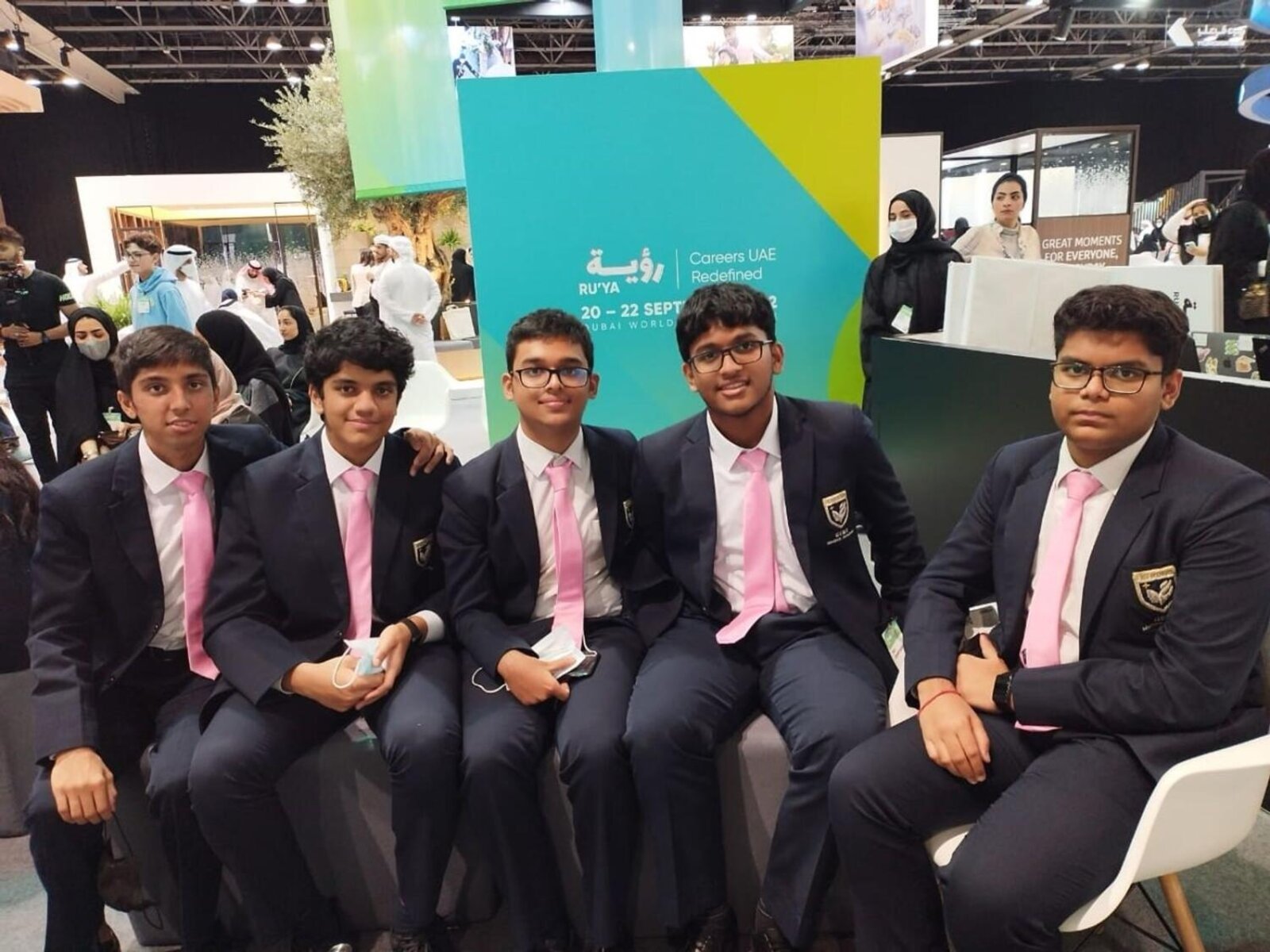
Tech to boost food security: A group of students in Dubai plan to launch a platform to allow low-income households to purchase groceries at a discounted price, Khaleej Times reports. The Project Ubuntu app and website will focus on vegetables and bakery items at supermarkets that are nearing their best-buy dates and offer reduced prices, ultimately minimizing food waste across Dubai grocery shops.
A-maize-ing innovators: The GEMS Modern Academy highschoolers developed their idea with the help of one of their teachers and published a research paper covering all the relevant market analysis in the International Journal of Innovative Science and Research Technology. The kids also raised some USD 2.7k through a crowdfunding campaign to help bring the platform to life.
CALENDAR
DECEMBER
6-8 December (Tuesday-Thursday): World Circular Economy Forum WCEF2022, Kigali, Rwanda.
7 December (Wednesday): The Big 5 Global Construction Impact Summit, Dubai World Trade Center, Dubai, UAE.
7-19 December (Wednesday-Monday): The UN’s 15th meeting of the Conference of the Parties to the Convention on Biological Diversity (COP15), Montreal, Canada.
9 December (Friday): Arab-China summit, Saudi Arabia.
13-14 December (Tuesday-Wednesday): Seminar on EU standards for agri-food products for the Gulf Cooperation Council countries, Grand Millennium Business Bay Hotel, Dubai, UAE.
13-15 December (Tuesday-Thursday): International Renewable Energy Congress, Hammamet, Tunisia.
JANUARY 2023
10-12 January (Tuesday-Thursday): The Future Minerals Forum, Riyadh, Saudi Arabia.
12 January (Thursday): Business Transition to Net-Zero – the Path Towards a Successful Low-Carbon Future Forum, Bahrain.
13 January (Friday): The International Renewable Energy Agency’s Youth Forum, Abu Dhabi, UAE.
14-21 January (Saturday-Saturday): Abu Dhabi Sustainability Week, Abu Dhabi, UAE.
16-18 January (Monday-Wednesday): EcoWASTE, Abu Dhabi National Exhibition Center (ADNEC), UAE.
16-18 January (Monday-Wednesday): World Future Energy Summit, Abu Dhabi National Exhibition Center (ADNEC), UAE.
January 2023: Bid submission deadline for green hydrogen projects to Hydrogen Oman (Hydrom).
FEBRUARY 2023
6-8 February (Monday-Wednesday): Saudi International Marine Exhibition and Conference, Hilton Riyadh, Saudi Arabia.
21-22 February (Tuesday-Wednesday): The Arab Green Summit, Dubai, UAE.
21-23 February (Tuesday-Thursday): World Environment, Social and Governance (ESG) Summit, Dubai, UAE.
MARCH 2023
15-19 March (Wednesday-Sunday): Qatar International Agricultural and Environmental Exhibition, Doha, Qatar.
MAY 2023
1-4 May (Monday-Thursday): Arabian Travel Market, Dubai World Trade Centre, Dubai, UAE. Register here.
29-31 May (Monday-Wednesday): Electric Vehicle Innovation Summit, Abu Dhabi National Exhibition Centre, Abu Dhabi, UAE.
JUNE 2023
Bloomberg New Economy Gateway Africa Conference, Marrakesh, Morocco.
1-3 June (Thursday-Saturday): Envirotec and Energie Expo, UTICA, Tunis, Tunisia.
SEPTEMBER 2023
Chariot Limited and Total Eren’s feasibility study on a 10 GW green hydrogen plant in Mauritania to be completed.
OCTOBER 2023
2-4 October (Monday-Wednesday): WETEX and Dubai Solar Show, Dubai World Trade Centre, Dubai, United Arab Emirates.
NOVEMBER 2023
6-17 November (Monday-Friday): The UAE will host COP28.
EVENTS WITH NO SET DATE
End-2022
KSA’s Neom wants to tender three concrete water reservoir projects to up its water storage capacity by 6 mn liters.
2023
Early 2023: Egypt’s KarmSolar to launch KarmCharge, the company’s EV charging venture.
1Q2023: Oman will award two blocks of land for green hydrogen projects in Duqm, Oman.
Mid-2023: Sale of Sembcorp Energy India Limited to consortium of Omani investors to close.
Phase C of the 900-MW of the Mohammed bin Rashid Al Maktoum Solar Park in Dubai to be completed.
Saudi Basic Industries Corporation (Sabic) steam cracker furnace powered by renewable energy to come online.
4Q2023: Oman to award four blocks of land for green hydrogen projects in Thumrait, Oman.
2024
End-2024: Emirati Masdar’s 500 MW wind farm in Uzbekistan to begin commercial operations.
QatarEnergy’s industrial cities solar power project will start electricity production.
First 1.5 GW phase of Morocco’s Xlinks solar and wind energy project to be operational.
2025
Second 1.5 GW phase of Morocco’s Xlinks solar and wind energy project to be operational.
UAE to have over 1k EV charging stations installed.
2026
1Q 2026: QatarEnergy’s USD 1 bn blue ammonia plant to be completed.
End-2026: HSBC Bahrain to eliminate single-use PVC plastic cards.
Iraq’s Mass Group Holding wants to invest EUR 1 bn on its thermal plant Mintia in Romania to have 62% of run on renewable energy, while expanding its energy capacity to at least 1.29k MWh.
2027
MENA’s district cooling market is expected to reach USD 15 bn.
2030
UAE’s Abu Dhabi Commercial Bank (ADCB) wants to provide AED 35 bn in green financing.
UAE targets 14 GW in clean energy capacity.
Tunisia targets 30% of renewables in its energy mix.
Qatar wants to generate USD 17 bn from its circular economy, creating 9k-19k jobs.
Morocco’s Xlinks solar and wind energy project to generate 10.5 GW of energy.
2035
Qatar to capture up to 11 mn tons of CO2 annually.
2045
Qatar’s Public Works Authority’s (Ashghal) USD 1.5 bn sewage treatment facility to reach 600k cm/d capacity.
2060
Nigeria aims to achieve its net-zero emissions target.
Enterprise Climate is available without charge thanks to the generous support of HSBC (tax ID: 204-901-715), the leading corporate and retail lender in Egypt; and Infinity Power (tax ID: 305-170-682), the leading generator and distributor of renewable energy in Africa and the Middle East. Enterprise Climate is delivered Mon-Thurs before 4 am UAE time. Were you forwarded this copy? Sign up for your own delivery at climate.enterprise.press. Contact us on climate@enterprisemea.com.

